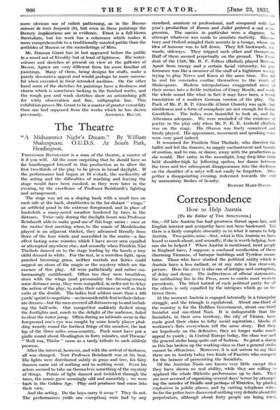The Theatre
"A Midsummer Night's Dream." By William Shakespeare. O.U.D.S. At South Park,
Headington. - PROFESSOR REINHARDT is a man of the theatre, a master of it if you will. All the more surprising that he should have so far handicapped himself in this production as to allow the first two-thirds of the play to be given in broad daylight. If the performance had begun at 10 o'clock, the mediocrity of the acting and the difficulties of reaching and leaving the stage would have been masked, as they were later in the evening, by the excellence of Professor Reinhardt's lighting and arrangement.
The stage was set on a sloping bank with a small tree on each side at the back, shrubberies in the far-distant " wings," an artificial pond in the extreme foreground, and in place of backcloth a many-acred meadow bordered by trees in the distance. Twice only during the daylight hours was Professor Reinhardt able to make good use of this huge arena : once at the rustics' first meeting, when, to the music of Mendelssohn played in an adjacent thicket, they advanced literally from three of the four winds and assembled in the centre—a fine effect lasting some minutes which I have never seen equalled or attempted anywhere else ; and secondly when Frafilein Nini Theilade danced on to the stage leading by the hands a tiny child dressed in white. For the rest, in a merciless light, upon parched browning grass, neither mortals nor fairies could suggest an atom of the magic or the mystery which are the essence of this play. All were pathetically and rather em- barrassingly earthbound. Often too they were breathless, since with the wings (and presumably the dressing-rooms) some distance away, they were compelled, in order not to delay the action of the play, to make their entrances as well as their exits at the double. The ladies had seldom more than a 100 yards' sprint to negotiate—no inconsiderable feat in their elabor- ate dresses—but the men covered all distances up to and includ- ing the half-mile. One competitor suddenly dashed along the footlights and, much to the delight of the audience, failed to clear the water jump. Often during an intimate scene in the foreground one's eye was caught by some lonely player plod- ding wearily round the furthest fringe of the meadow, the last lap of the three miles cross-country. Puck must have put a girdle round about Headington in forty minutes, and Theseus' " Well run, Thisbe " came as a tardy tribute to such athletic prowess.
After the interval, however, and with the arrival of darknesi, all was changed. Now Professor Reinhardt was at his best. His lights were distributed subtly in grass and tree, his fairy dancers came out of nothing and to nothing went. Even his actors seemed to take on themselves something of the mystery
of things., . Points of danced and twinkled through the trees, the imusic.grew seemingly odd and .unearthly ; we were - -back in the Golden Age. - Play -and:producer had -come. into their own.
And the acting. Do the boys carry it away ? They do not. The -performances-- (with one exception) were bad by any standard, amateur or professional, and compared with lag year's production of Romeo-and Juliet pointed sad retro- gression. The conies in particular were a disgrace. No attempt whatever was made to simulate rusticity. Blooms_ bury and Oxford mingled their accents in a troupe, whose one idea of humour was to fall down. They fell backwards, for- wards, sideways. They tripped each other and themselves. Half of them seemed perpetually on the ground. The Presi- dent of the Club,' Mr. R. F. Felton (Balliol), played Bottom. Apart from energy and a certain facial virtuosity, his per- formance was like a member of the staff of a highbrow weekly trying to play Nervo and Knox at the same time. Nor did he and his comrades confine themselves to the words of Shakespeare. _ Modern interpolations exaggerated most of their scenes into a feeble imitation of Crazy Month, and made the whole sound like what in fact it may have been, a literal translation of a modern German version of the play. The Puck of Mr. P. B. P. Glenville (Christ Church) was agile, but nimbleness and a form of semaphore are not enough for Robin Goodfellow. The ladies were beautiful to look at, and the . Athenians adequate.. We were reminded of the existence of poetry in the play only when Mr. P. R. E. Arnhold (Balliol) was on the stage. • His Oberon was finely conceived and firmly played. His appearance, movement and speaking voice were very good indeed.
• It remained for Fraiilein Nini Theilade, who directed the
• ballet and led the dancers, to supply enchantment and beauty of motion, and to run, or -dance, away with the production as she would. Her entry in the moonlight, long deep-hlue train held shoulder-high by following sprites, her dance between the trees and her subsequent disappearance into the darkness on the shoulder of a satyr 'will not ea-- fly be forgotten. Alto- gether a disappointing evening, redeemed towards the end by momentary flashes of beauty.
IICPERT HART-DAVIS.








































 Previous page
Previous page